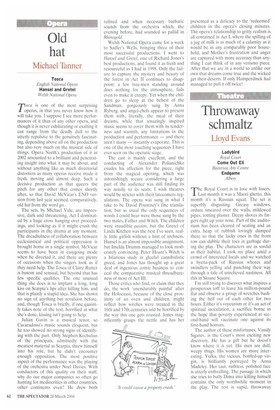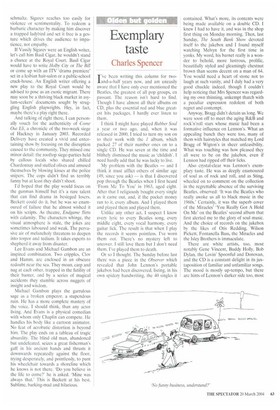Throwaway schmaltz
Lloyd Evans
Ladybird Royal Court Come Out Eli Battersea Arts Centre Endgame Albey
The Royal Court is in love with losers. Last month it was a Maori ghetto, this month it's a Russian squat. The set is superbly disgusting. Greasy windows, ordure smeared over the walls, mildewed pipes, rotting plaster. Decay shoves its fingers right up your nose. Part of the auditorium has been cleared of seating and an extra heap of rubbish lovingly dumped there so that the lucky ones in the front row can dabble their toes in garbage during the play. The characters are as sordid as their habitat. I took my place amid a crowd of interested locals and we watched a hyena-pack of Russian whores and swindlers yelling and punching their way through a tale of unrelieved nastiness. All this in Sloane Square.
I'm still trying to discover what inspires a prosperous toff to leave his million-pound flat and observe a group of wretches bashing the hell out of each other for two hours. Either it's voyeurism or it's an act of spiritual inoculation, a sacrifice borne in the hope that poverty experienced at second-hand will vaccinate one against its first-hand horrors.
The author of these misfortunes, Vassily Sigarev, is the Court's most exciting new discovery. He has a gift but he doesn't know where it is yet. His men are dull, weepy thugs. His women are more interesting. Yulka, the vicious, bottled-up virgin, is brilliantly portrayed by Anna Madeiey. Her taut, ruthless, polished face is utterly enthralling. The passage in which she tries to bully Dima into killing himself contains the only worthwhile moment in the play. The rest is vapid, throwaway
schmaltz. Sigarev reaches too easily for violence or sentimentality. To redeem a barbaric character by making him discover a trapped ladybird and set it free is a gesture which drives the audience to impatience, not empathy.
If Vassily Sigarev were an English writer, let's call him Basil Cigar, he wouldn't stand a chance at the Royal Court. Basil Cigar would have to write Holby City or The Bill or come up with an ITV 'drama premiere' set in a lesbian hair-salon or a public-school crack-house. An English writer offering a new play to the Royal Court would be advised to pose as an exotic migrant. There may soon be a thriving black market in asylum-seekers' documents sought by struggling English playwrights, Hey, in fact, maybe there's a play right there.
And talking of right there, I can personally vouch for the authenticity of Come Out Eli, a chronicle of the two-week siege of Hackney in January 2003. Recorded Delivery have created a vivid and entertaining show by focusing on the disruption caused to the community. They missed one minor detail: the rooftop siege-parties held by callous locals who shared chilled Chardonnay and stuffed olives and amused themselves by blowing kisses at the police snipers. The cops didn't find us terribly funny but at least they didn't shoot.
I'd hoped that the play would focus on the gunman himself but it's a rare talent that can find drama in besieged losers. Beckett could do it, but he was so enamoured of failure that he almost wished it on his scripts. As theatre, Endgame flirts with calamity. The characters whinge, the visual atmosphere is stale, the jokes are sometimes laboured and weak. The pervasive air of melancholy threatens to deepen into torpor and tedium. It takes experts to shepherd it away from disaster, Lee Evans and Michael Gambon are an inspired combination. Two cripples, Cloy and Hamm, are enclosed in an obscure redoubt near the sea. They moan, carp and nag at each other, trapped in the futility of their banter, and by a series of magical accidents they stumble across nuggets of insight and wisdom.
Michael Gambon plays the garrulous sage as a broken emperor, a stupendous ruin. He has a more complete mastery of the voice, I should think, than any actor living. And Evans is a physical comedian with whom only Chaplin can compete. He handles his body like a cartoon animator. No feat of acrobatic distortion is beyond him. The play ends on a tableau of tragic absurdity. The blind old man, abandoned but undefeated, seizes a great fisherman's gaff in his ancient hands and thrusts it downwards repeatedly against the floor, trying desperately, and pointlessly, to punt his wheelchair towards a shoreline which he knows is not there. 'Do you believe in the life to come?' he is asked. 'Mine was always that.' This is Beckett at his best. Sublime, barking-mad and hilarious.



















































































 Previous page
Previous page